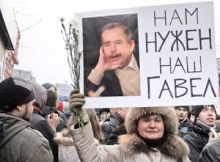The international community of nations has been closely following Russia’s domestic political situation. The latest rally in Moscow failed to match Ukraine’s Maidan in Kyiv, with the organizers failing to arrange for a long enough protest action. Even so, the overall impression is that Russia has started undergoing tectonic, irreversible changes. Where these changes are aimed is a different story. One thing is certain: what’s happening in Russia is democracy-oriented and it may well alter the situation in Europe and Asia — in the first place, the situation in Ukraine that hasn’t completed its state-building process whereas Russia, with its sovereign democracy, keeps building [its own kind of] capitalism. Under the circumstances, official Kyiv isn’t prepared to deal with Ukraine’s past and Moscow’s future Maidan, that it isn’t prepared to meet whatever challenges New Russia may come up with, in the aftermath of this protest movement. Could these massive protest rallies cause Russia’s regime to change and make that country more democratic? What do all those protesters lack to make the regime pay heed to their demands? More on this in the following interview with Georgy SATAROV, president, INDEM Applied Political Study Foundation (“INDEM” is an acronym of “Information for Democracy”).
“We could discuss such possibilities, but there is no telling whether this will happen on a hundred percent basis. What we lack is a kind of common denominator between Moscow and the regions. After all, there is a difference between the protest moods in Moscow and regions. This is number one. Number two: We lack the scope we need. Number three: We lack the new adequate leaders.”
Many people are reported to have gathered on Saturday.
“That was mostly self-organized. In this sense the regime has to be credited for making people walk out on the street with its words and deeds, rather than the opposition.
“People are going to change this regime using their own resources, without expecting any help from the West. I’ve never heard a single motto like that during a single rally. This slogan is unacceptable in Russia.”
How would you assess the events in Russia in terms of your country’s doubtlessly peaceful movement toward democracy? How can these events help make true democratic reforms?
“Such protests should bring forth a new kind of political self-organization. In fact, steps have started being taken in this direction. This movement must beget new [political] parties. This is very important, considering that the old ones have discredited themselves.”
What would be the underpinning principles of such new parties? How would you visualize their leaders?
“A very good question, although I’m not prepared to answer it at the moment. As for the new kind of parties, I believe the very fact of their novelty is more important than that of their emergence. Political rejuvenation is what we need. Let the electorate choose the foundation [platform]. This market must have fresh demand. Actually, this is a matter of creative initiative of the masses.”
Would President Medvedev’s latest proposals, concerning simplified registration procedures, help the emergence of such new parties?
“Medvedev actually didn’t count on that much, but [I believe that] they will be instrumental.”
How realistic do you think are the statements made by politicians to the effect that the regime may provoke confrontations during such [protest] rallies and finally toughen the regime?
“I wrote about this to Illarionov two weeks ago. This is absolutely realistic. This scenario can’t be shrugged off.”
Are there any signs of the regime getting prepared to play out this scenario?
“In the first place, the assignment of key posts to Cheka men. I mean the Duma and the Presidential Administration. Of course, this strikes a loud discordant note with Medvedev’s sooth talk about democracy. Second, the provocative persecution of Udaltsov which is apparently aimed at causing an officially unauthorized action of protest. Obviously provocative acts took place on Manezhnaya Square (December 6). All of them are on record. The only thing that made them fail was a sharp increase in the protesting numbers. Things like that were and are still being prepared. This is something one must bear in mind.”








